Violin Sheet Music
 "... you watch Jimi Hendrix literally reinvent the instrument. He was playing from somewhere else. He was really a kind of hybrid, and I can't even begin to imagine where he came from" Steve Vai
"... you watch Jimi Hendrix literally reinvent the instrument. He was playing from somewhere else. He was really a kind of hybrid, and I can't even begin to imagine where he came from" Steve Vai
John D. Loudermilk
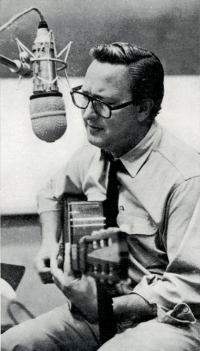
John D. Loudermilk Jr. (March 31, 1934 – September 21, 2016) was an American singer and songwriter. Although he had his own recording career during the 1950s and 1960s, he was primarily known as a songwriter. His best-known songs include "Indian Reservation", a 1968 UK cover by Don Fardon and a 1971 U.S. No. 1 hit for Paul Revere & the Raiders; "Ebony Eyes", a 1961 U.K. No. 1 and U.S. No. 8 for the Everly Brothers; "Tobacco Road", a 1964 Top 20 hit in both the U.S. and the U.K. for the Nashville Teens; "This Little Bird", a U.K. No. 6 for Marianne Faithfull in 1965, and "Then You Can Tell Me Goodbye", a U.S. Top Ten hit in 1967 for the Casinos and also a U.S. No. 1 country hit for Eddy Arnold the following year.
Suzuki method

The Suzuki method is a music curriculum and teaching philosophy dating from the mid-20th century, created by Japanese violinist and pedagogue Shinichi Suzuki (1898–1998). The method aims to create an environment for learning music which parallels the linguistic environment of acquiring a native language. Suzuki believed that this environment would also help to foster good moral character.
Helmut Lachenman
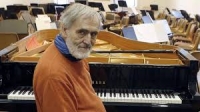
Helmut Friedrich Lachenmann (born 27 November 1935) is a German composer of contemporary classical music. His work has been associated with "instrumental musique concrète".
Lachenmann was born in Stuttgart and after the end of the Second World War (when he was 11) started singing in his local church choir. Showing an early aptitude for music, he was already composing in his teens. He studied piano with Jürgen Uhde and composition and theory with Johann Nepomuk David at the Musikhochschule Stuttgart from 1955 to 1958 and was the first private student of the Italian composer Luigi Nono in Venice from 1958 to 1960. He also worked briefly at the electronic music studio at the University of Ghent in 1965, composing his only published tape piece Szenario during that period, but thereafter focused almost exclusively on purely instrumental music. The brutality of his music led Francisco Estévez to compare his work to the paintings of Francis Bacon.
Lachenmann was born in Stuttgart and after the end of the Second World War (when he was 11) started singing in his local church choir. Showing an early aptitude for music, he was already composing in his teens. He studied piano with Jürgen Uhde and composition and theory with Johann Nepomuk David at the Musikhochschule Stuttgart from 1955 to 1958 and was the first private student of the Italian composer Luigi Nono in Venice from 1958 to 1960. He also worked briefly at the electronic music studio at the University of Ghent in 1965, composing his only published tape piece Szenario during that period, but thereafter focused almost exclusively on purely instrumental music. The brutality of his music led Francisco Estévez to compare his work to the paintings of Francis Bacon.
Ika

Ika musician & music producer, mixing and mastering services.
Hugo Bouma
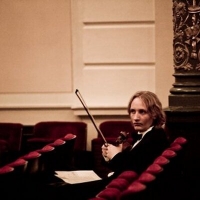
Hugo Bouma, a born and bred Amsterdammer. ... as composer.
Traditional

Émile Sauret

Émile Sauret was a French violinist and composer. Sauret wrote over 100 violin pieces, including a famous cadenza for the first movement of Niccolò Paganini's First Violin Concerto, and the "Gradus ad Parnassum".
Alejandro Alfonso
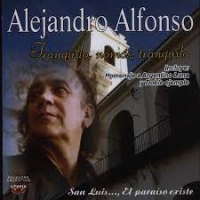
Alejandro Alfonso Musical artist Tip: Search for English results only. You can specify your search language in Preferences
Songs Hoy Quiero Hacerte un Pedido Tranquilo, Nomás, Tranquilo · 2012 Zamba para los Cisnes Tranquilo, Nomás.
Songs Hoy Quiero Hacerte un Pedido Tranquilo, Nomás, Tranquilo · 2012 Zamba para los Cisnes Tranquilo, Nomás.
Mozart

Wolfgang Amadeus Mozart, full name Johann Chrysostom Wolfgang Amadeus Mozart (27 January 1756 â 5 December 1791) was a prolific and influential composer of the Classical era. His over 600 compositions include works widely acknowledged as pinnacles of symphonic, concertante, chamber, piano, operatic, and choral music. Mozart is among the most enduringly popular of classical composers, and many of his works are part of the standard concert repertoire.
Mozart's music, like Haydn's, stands as an archetypal example of the Classical style. His works spanned the period during which that style transformed from one exemplified by the style galant to one that began to incorporate some of the contrapuntal complexities of the late Baroque, complexities against which the galant style had been a reaction. Mozart's own stylistic development closely paralleled the development of the classical style as a whole. In addition, he was a versatile composer and wrote in almost every major genre, including symphony, opera, the solo concerto, chamber music including string quartet and string quintet, and the piano sonata. While none of these genres were new, the piano concerto was almost single-handedly developed and popularized by Mozart. He also wrote a great deal of religious music, including masses; and he composed many dances, divertimenti, serenades, and other forms of light entertainment.
The central traits of the classical style can be identified in Mozart's music. Clarity, balance, and transparency are hallmarks of his work.
Mozart's music, like Haydn's, stands as an archetypal example of the Classical style. His works spanned the period during which that style transformed from one exemplified by the style galant to one that began to incorporate some of the contrapuntal complexities of the late Baroque, complexities against which the galant style had been a reaction. Mozart's own stylistic development closely paralleled the development of the classical style as a whole. In addition, he was a versatile composer and wrote in almost every major genre, including symphony, opera, the solo concerto, chamber music including string quartet and string quintet, and the piano sonata. While none of these genres were new, the piano concerto was almost single-handedly developed and popularized by Mozart. He also wrote a great deal of religious music, including masses; and he composed many dances, divertimenti, serenades, and other forms of light entertainment.
The central traits of the classical style can be identified in Mozart's music. Clarity, balance, and transparency are hallmarks of his work.
Nigel Hess
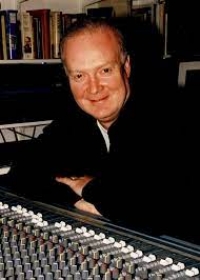
Nigel John Hess is a British composer, best known for his television, theatre and film soundtracks, including the theme tunes to Campion, Maigret, Wycliffe, Dangerfield, Hetty Wainthropp Investigates, Badger and Ladies in Lavender.
Fiorelli
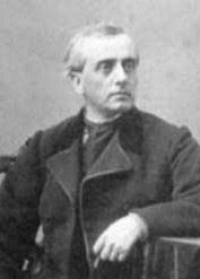
Giuseppe Fiorelli Born: May 5, 1904 Date and place of death: 6 August 1960, Rome, Italy.
Koji Kondo

Koji Kondo (近藤浩治 Kondō Kōji?, born August 13, 1960) is a Japanese video game composer and sound director who has been employed at Nintendo since 1984. He is best known for scoring numerous titles in the Mario and The Legend of Zelda series.
Luigi Boccherini
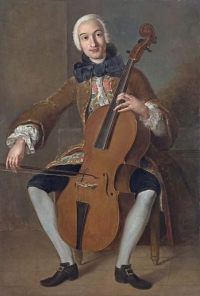
Ridolfo Luigi Boccherini (/ˌbɒkəˈriːni/, also US: /ˌboʊk-/, Italian: (About this soundlisten); 19 February 1743 – 28 May 1805) was an Italian, later Spanish, composer and cellist of the Classical era whose music retained a courtly and galante style even while he matured somewhat apart from the major European musical centers. He is best known for a minuet from his String Quintet in E, Op. 11, No. 5 (G 275), and the Cello Concerto in B flat major (G 482). The latter work was long known in the heavily altered version by German cellist and prolific arranger Friedrich Grützmacher, but has recently been restored to its original version.
Andres Valero-Castels
Born in Silla (Valencia, Spain) in 1973, Andrés Valero Castells studied music theory, trumpet and piano at the Conservatories of Valencia and Murcia before taking up composition, where he found his real calling. His works have been performed and published in Spain, France, the United States and Switzerland.
Zoltan Paulinyi
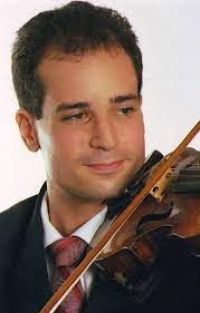
Zoltán Paulínyi Körmendy (Pittsfield, MA, 1977) conhecido pelo nome artístico de Zoltan Paulini, é um violinista, violista (barroco e moderno) e compositor americano-brasileiro. É profissionalmente ativo desde 1995, e utiliza principalmente instrumentos fabricados e restaurados pelo luthier Carlos Martins del Picchia.
Edward Mollenhauer
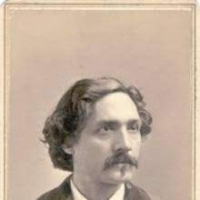
Edward Mollenhauer (1827–1914) was an American violinist and composer.Mollenhauer was born in Erfurt, Prussia. He studied under Heinrich Wilhelm Ernst and Louis Spohr, and had become famous in Germany and at Saint Petersburg before he was twenty-five years old. To escape conscription, he went to England, joined Jullien, and accompanied him to New York City in 1853. He settled there and became a founder in America of the Conservatory method of teaching the violin. Mollenhauer's best-known compositions for the violin are his quartets. He also wrote the operas, The Corsican Bride (1861), Breakers (1881), and The Masked Ball. He soloed with the New York Philharmonic Orchestra for six years. He also created a piece for violin with piano accompaniment, "The Boy Paganini" which is still played worldwide. Among those he taught were African-American soloist and orchestra director, Walter F. Craig.
COLORADO COOK BOOK
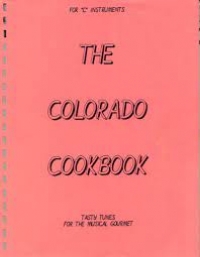
FOR "C" INSTRUMENTS. THE. COLORADO. COOKBOOK. TASTY TUNES. FOR THE MUSICAL GOURMET
bijan mortazavi
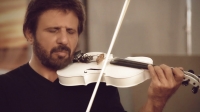
Bijan Mortazavi (Persian: بیژن مرتضوی, born November 16, 1957) is an Iranian virtuoso violinist, musician, composer, songwriter, arranger and singer.Born in the city of Sari, Iran. Mortazavi studied music in Tehran. He was trained in improvisation, orchestration, arrangement, quarter tone technique, and dastgah by various well-known violinists in Iran.
Carlos Paredes
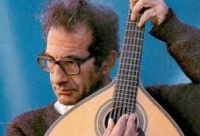
Carlos Paredes ComSE (Portuguese pronunciation: ; 16 February 1925 – 23 July 2004) was a virtuoso Portuguese guitar player and composer. He is regarded as one of the greatest players of Portuguese guitar of all-time.
Born in Coimbra, Portugal, in a family with a long tradition of guitar playing, he was taught to play the Portuguese guitar by his father, Artur Paredes. He composed numerous soundtracks for cinema and theatre, such as the soundtrack for the Portuguese film Os Verdes Anos (1963), which contains his famous piece "Canção Verde Anos". He released several recordings as a solo artist and performed in numerous countries worldwide.Besides his music career, Paredes also worked in the public service for most of his life. In 1958, during Portugal's dictatorial Estado Novo regime, he was imprisoned for 18 months for joining the Portuguese Communist Party, at the time an illegal organization.
Born in Coimbra, Portugal, in a family with a long tradition of guitar playing, he was taught to play the Portuguese guitar by his father, Artur Paredes. He composed numerous soundtracks for cinema and theatre, such as the soundtrack for the Portuguese film Os Verdes Anos (1963), which contains his famous piece "Canção Verde Anos". He released several recordings as a solo artist and performed in numerous countries worldwide.Besides his music career, Paredes also worked in the public service for most of his life. In 1958, during Portugal's dictatorial Estado Novo regime, he was imprisoned for 18 months for joining the Portuguese Communist Party, at the time an illegal organization.
Ludwig van Beethoven

Ludwig van Beethoven (/ˈlʊdvɪɡ væn ˈbeɪt(h)oʊvən/ (About this soundlisten); German: (About this soundlisten); baptised 17 December 1770 – 26 March 1827) was a German composer and pianist. A crucial figure in the transition between the classical and romantic eras in classical music, he remains one of the most recognized and influential musicians of this period, and is considered to be one of the greatest composers of all time.
Beethoven was born in Bonn, the capital of the Electorate of Cologne, and part of the Holy Roman Empire. He displayed his musical talents at an early age and was vigorously taught by his father Johann van Beethoven, and was later taught by composer and conductor Christian Gottlob Neefe. At age 21, he moved to Vienna and studied composition with Joseph Haydn. Beethoven then gained a reputation as a virtuoso pianist, and was soon courted by Prince Lichnowsky for compositions, which resulted in Opus 1 in 1795.
Beethoven was born in Bonn, the capital of the Electorate of Cologne, and part of the Holy Roman Empire. He displayed his musical talents at an early age and was vigorously taught by his father Johann van Beethoven, and was later taught by composer and conductor Christian Gottlob Neefe. At age 21, he moved to Vienna and studied composition with Joseph Haydn. Beethoven then gained a reputation as a virtuoso pianist, and was soon courted by Prince Lichnowsky for compositions, which resulted in Opus 1 in 1795.
Howard Blake
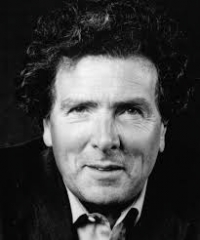
Howard Blake OBE (born 28 October 1938, London) is an English composer whose career has spanned over 50 years and produced more than 650 works. Most successful is his soundtrack for Channel 4’s 1982 film The Snowman including the song Walking In The Air. He is increasingly recognised for his classical works including concertos, oratorios, ballets, operas and many instrumental pieces. The New Grove Dictionary of Music and Musicians states: ‘Howard Blake has achieved fame as pianist, conductor and composer
Moulin Rouge
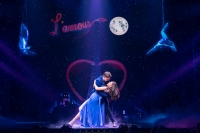
Moulin Rouge! (/ˌmuːlæ̃ ˈruːʒ/, French: ) is a 2001 jukebox musical romantic drama film directed, co-produced, and co-written by Baz Luhrmann. The film tells the story of a young English poet/writer, Christian (Ewan McGregor), who falls in love with the star of the Moulin Rouge, cabaret actress and courtesan Satine (Nicole Kidman). It uses the musical setting of the Montmartre Quarter of Paris, France. The film is the third part of Luhrmann's "Red Curtain Trilogy," following Strictly Ballroom and Romeo + Juliet.
Zdenko Fibich
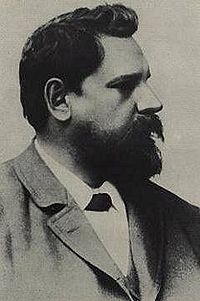
Zdeněk Fibich (Czech pronunciation: , 21 December 1850 – 15 October 1900) was a Czech composer of classical music. Among his compositions are chamber works (including two string quartets, a piano trio, piano quartet and a quintet for piano, strings and winds), symphonic poems, three symphonies, at least seven operas (the most famous probably Šárka and The Bride of Messina), melodramas including the substantial trilogy Hippodamia, liturgical music including a mass – a missa brevis; and a large cycle (almost 400 pieces, from the 1890s) of piano works called Moods, Impressions, and Reminiscences. The piano cycle served as a diary of sorts of his love for a piano pupil. He was born in Všebořice (Šebořice) near Čáslav.
Robbie Williams
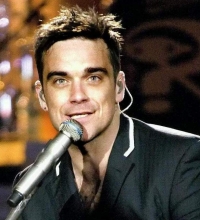
Robert Peter Maximilian Williams (born 13 February 1974) is a Grammy Award-nominated, 15-time BRIT Award-winning English singer-songwriter. His career started as a member of the pop band Take That in 1990. He left Take That in 1995 to begin his solo career, after selling 25 million records with the group.
His album sales stand at over 55 million, with singles sales over 17 million.
Williams entered the The Guinness Book of World Records when in just one day he sold more than 1.6 million tickets for his 2006 world tour. He has been the recipient of many awards, including fifteen BRIT and six ECHO awards. In 2004, he was inducted into the UK Music Hall of Fame, after being voted as the Greatest artist of the 1990s.
Robbie Williams is the artist who is currently featured the most times in the UK Now That's What I Call Music! series. In the first 68 Now!s he has appeared 29 times (including 4 times with Take That). His first appearance was with Take That on Now 22 and his most recent appearance was on Now 66 with "She's Madonna".
His album sales stand at over 55 million, with singles sales over 17 million.
Williams entered the The Guinness Book of World Records when in just one day he sold more than 1.6 million tickets for his 2006 world tour. He has been the recipient of many awards, including fifteen BRIT and six ECHO awards. In 2004, he was inducted into the UK Music Hall of Fame, after being voted as the Greatest artist of the 1990s.
Robbie Williams is the artist who is currently featured the most times in the UK Now That's What I Call Music! series. In the first 68 Now!s he has appeared 29 times (including 4 times with Take That). His first appearance was with Take That on Now 22 and his most recent appearance was on Now 66 with "She's Madonna".
Elpidio Ramírez
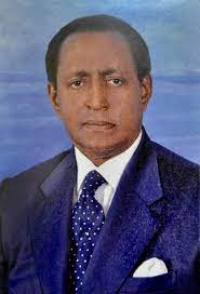
Elpidio Ramírez Burgos, conocido como El Viejo Elpidio (Xoxocapa, Ilamatlán, Veracruz, México, 4 de marzo de 1882-14 de julio de 1960) fue un violinista, compositor, arreglista y revolucionario mexicano. Es considerado precursor del género musical conocido como huapango.
Gabriel Faure

Gabriel Urbain Fauré (12 May 1845 – 4 November 1924) was a French composer, organist, pianist, and teacher. He was the foremost French composer of his generation, and his musical style influenced many 20th century composers. His harmonic and melodic language affected how harmony was later taught.
Astor Piazzola

Astor Pantaleón Piazzolla (Spanish pronunciation: , Italian pronunciation: ; March 11, 1921 – July 4, 1992) was an Argentine tango composer, bandoneon player, and arranger. His oeuvre revolutionized the traditional tango into a new style termed nuevo tango, incorporating elements from jazz and classical music. A virtuoso bandoneonist, he regularly performed his own compositions with a variety of ensembles.
In 1992, American music critic Stephen Holden described Piazzolla as "the world's foremost composer of tango music"
In 1992, American music critic Stephen Holden described Piazzolla as "the world's foremost composer of tango music"
Pablo de Sarasate

Pablo Martín Melitón de Sarasate y Navascués (10 March 1844 – 20 September 1908) was a Spanish violinist and composer of the Romantic period.
Old Crow Medicine Show
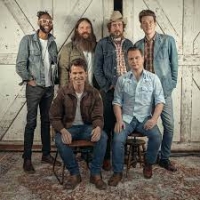
Old Crow Medicine Show is an Americana string band based in Nashville, Tennessee, that has been recording since 1998. They were inducted into the Grand Ole Opry on September 17, 2013. Their ninth album, Remedy, released in 2014, won the Grammy Award for Best Folk Album. The group's music has been called old-time, folk, and alternative country. Along with original songs, the band performs many pre-World War II blues and folk songs.
Bach

Johann Sebastian Bach (31 March 1685 – 28 July 1750) was a German composer and organist whose sacred and secular works for choir, orchestra, and solo instruments drew together the strands of the Baroque period and brought it to its ultimate maturity. Although he introduced no new forms, he enriched the prevailing German style with a robust contrapuntal technique, an unrivalled control of harmonic and motivic organisation in composition for diverse musical forces, and the adaptation of rhythms and textures from abroad, particularly Italy and France.
Revered for their intellectual depth and technical and artistic beauty, Bach's works include the Brandenburg concertos; the Goldberg Variations; the English Suites, French Suites, Partitas, and Well-Tempered Clavier; the Mass in B Minor; the St. Matthew Passion; the St. John Passion; The Musical Offering; The Art of Fugue; the Sonatas and Partitas for violin solo; the Cello Suites; more than 200 surviving cantatas; and a similar number of organ works, including the celebrated Toccata and Fugue in D Minor.
While Bach's fame as an organist was great during his lifetime, he was not particularly well-known as a composer. His adherence to Baroque forms and contrapuntal style was considered "old-fashioned" by his contemporaries, especially late in his career when the musical fashion tended towards Rococo and later Classical styles. A revival of interest and performances of his music began early in the 19th century, and he is now widely considered to be one of the greatest composers in the Western tradition.
Revered for their intellectual depth and technical and artistic beauty, Bach's works include the Brandenburg concertos; the Goldberg Variations; the English Suites, French Suites, Partitas, and Well-Tempered Clavier; the Mass in B Minor; the St. Matthew Passion; the St. John Passion; The Musical Offering; The Art of Fugue; the Sonatas and Partitas for violin solo; the Cello Suites; more than 200 surviving cantatas; and a similar number of organ works, including the celebrated Toccata and Fugue in D Minor.
While Bach's fame as an organist was great during his lifetime, he was not particularly well-known as a composer. His adherence to Baroque forms and contrapuntal style was considered "old-fashioned" by his contemporaries, especially late in his career when the musical fashion tended towards Rococo and later Classical styles. A revival of interest and performances of his music began early in the 19th century, and he is now widely considered to be one of the greatest composers in the Western tradition.
Dan Bowerly

Daniel Bowery. Dan is a session musician and teacher with over a decade of performing and recording experience. Since graduating from the London Centre of
Hans Millies
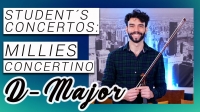
Hans Millies Musical composer Born: March 4, 1883 Died: January 23, 1957, Lübeck, Germany.
juan gabriel
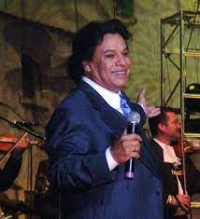
Alberto Aguilera Valadez (known as Juan Gabriel or simply Juanga; January 7, 1950 - August 28, 2016), Mexican singer and songwriter. Gabriel was the highest paid musician among Spanish singing musicians.
Having a star on the Hollywood Walk of Fame, the powerful voice of Latin America, Gabriel's albums have been sold more than 100 million times. The talented singer, who successfully represented Mexico in music, died at his home in California on August 28, 2016 at the age of 66. [
Having a star on the Hollywood Walk of Fame, the powerful voice of Latin America, Gabriel's albums have been sold more than 100 million times. The talented singer, who successfully represented Mexico in music, died at his home in California on August 28, 2016 at the age of 66. [
The Godfather
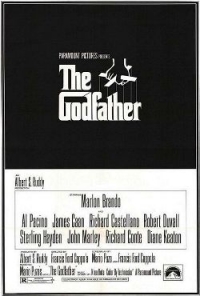
The Godfather is a 1972 crime drama film based on the 1969 novel of the same name by Mario Puzo and directed by Francis Ford Coppola, with a screenplay by Puzo, Coppola, and an uncredited Robert Towne. It stars Marlon Brando, Al Pacino, James Caan, Robert Duvall and Diane Keaton, and features Richard S. Castellano, Abe Vigoda and Sterling Hayden. The story spans ten years from 1945 to 1955 and chronicles the Italian-American Corleone crime family.
The Godfather received Academy Awards for Best Picture, Best Actor, and Best Adapted Screenplay, and has been selected for preservation in the United States National Film Registry. In addition, it is ranked as the second greatest film in American cinematic history, behind Citizen Kane on the AFI's 100 Years... 100 Movies (10th Anniversary Edition) list by the American Film Institute. It is also ranked as #1 on Metacritic's top 100 list and in the top 10 on Rotten Tomatoes' all-time best list.
Two sequels followed The Godfather: The Godfather Part II in 1974, and The Godfather Part III in 1990.
The Godfather received Academy Awards for Best Picture, Best Actor, and Best Adapted Screenplay, and has been selected for preservation in the United States National Film Registry. In addition, it is ranked as the second greatest film in American cinematic history, behind Citizen Kane on the AFI's 100 Years... 100 Movies (10th Anniversary Edition) list by the American Film Institute. It is also ranked as #1 on Metacritic's top 100 list and in the top 10 on Rotten Tomatoes' all-time best list.
Two sequels followed The Godfather: The Godfather Part II in 1974, and The Godfather Part III in 1990.
Franz Schubert

Franz Peter Schubert (German pronunciation: ; January 31, 1797 – November 19, 1828) was an Austrian composer. He wrote some 600 Lieder, nine symphonies (including the famous "Unfinished Symphony"), liturgical music, operas, some incidental music, and a large body of chamber and solo piano music. He is particularly noted for his original melodic and harmonic writing.
Schubert was born into a musical family, and received formal musical training through much of his childhood. While Schubert had a close circle of friends and associates who admired his work (amongst them the prominent singer Johann Michael Vogl), wide appreciation of his music during his lifetime was limited at best. He was never able to secure adequate permanent employment, and for most of his career he relied on the support of friends and family. He made some money from published works, and occasionally gave private musical instruction. In the last year of his life he began to receive wider acclaim. He died at the age of 31 of "typhoid fever", a diagnosis which was vague at the time; several scholars suspect the real illness was tertiary syphilis.
Interest in Schubert's work increased dramatically in the decades following his death. Composers like Franz Liszt, Robert Schumann and Felix Mendelssohn discovered, collected, and championed his works in the 19th century, as did musicologist Sir George Grove. Franz Schubert is now widely considered to be one of the greatest composers in the Western tradition.
Schubert was born into a musical family, and received formal musical training through much of his childhood. While Schubert had a close circle of friends and associates who admired his work (amongst them the prominent singer Johann Michael Vogl), wide appreciation of his music during his lifetime was limited at best. He was never able to secure adequate permanent employment, and for most of his career he relied on the support of friends and family. He made some money from published works, and occasionally gave private musical instruction. In the last year of his life he began to receive wider acclaim. He died at the age of 31 of "typhoid fever", a diagnosis which was vague at the time; several scholars suspect the real illness was tertiary syphilis.
Interest in Schubert's work increased dramatically in the decades following his death. Composers like Franz Liszt, Robert Schumann and Felix Mendelssohn discovered, collected, and championed his works in the 19th century, as did musicologist Sir George Grove. Franz Schubert is now widely considered to be one of the greatest composers in the Western tradition.
Giovanni Battista Vitali
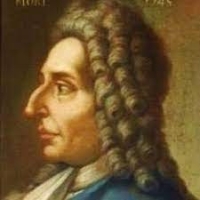
Giovanni Battista Vitali (18 February 1632 – 12 October 1692) was an Italian composer and violone player.Vitali was born in Bologna and spent all of his life in the Emilian region, moving to Modena in 1674. His teacher in his early years was probably Maurizio Cazzati (1616–1678), maestro di cappella at the main church in Bologna, San Petronio Basilica from 1657 to 1671.The first documented evidence of Vitali’s musical activities appears in the records of the San Petronio orchestra for 1658, when he is listed under the title ‘Violoni’, referring to the cello/bass instrument that he played (to be discussed below).
Vitali remained in the orchestra until 1673, when he took up an appointment as maestro di cappella at the chapel of the Confraternità del Rosario, Bologna. His first publication, Opus 1 (1666), tells us that he was a member of the Accademia dei Filaschisi. This musical institution, which had been established in 1633, disbanded in 1666 when most of its members joined the Accademia Filarmonica. Vitali is also listed as a member of the Accademia Filarmonica in 1666, the year of its founding. The academy archives record various details of its members, including where they came from (if not from Bologna) and their dates of birth and death. Vitali’s death date is here recorded as 12 October 1692.
Vitali remained in the orchestra until 1673, when he took up an appointment as maestro di cappella at the chapel of the Confraternità del Rosario, Bologna. His first publication, Opus 1 (1666), tells us that he was a member of the Accademia dei Filaschisi. This musical institution, which had been established in 1633, disbanded in 1666 when most of its members joined the Accademia Filarmonica. Vitali is also listed as a member of the Accademia Filarmonica in 1666, the year of its founding. The academy archives record various details of its members, including where they came from (if not from Bologna) and their dates of birth and death. Vitali’s death date is here recorded as 12 October 1692.
Carl Goldmark
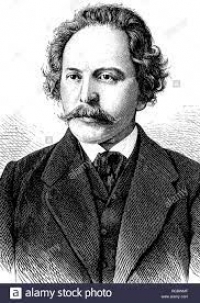
Karl Goldmark (born Károly Goldmark, Keszthely, May 18, 1830 – Vienna, January 2, 1915) was a Hungarian-born Viennese composer.[1Goldmark came from a large Jewish family. His father, Ruben Goldmark, was a chazan (cantor) to the Jewish congregation at Keszthely, Hungary, where Karl was born. Karl Goldmark's older brother Joseph became a physician and was later involved in the Revolution of 1848, and forced to emigrate to the United States. Karl Goldmark's early training as a violinist was at the musical academy of Sopron (1842–44).He continued his music studies there and two years later was sent by his father to Vienna, where he was able to study for some eighteen months with Leopold Jansa before his money ran out. He prepared himself for entry first to the Vienna Technische Hochschule and then to the Vienna Conservatory to study the violin with Joseph Böhm and harmony with Gottfried Preyer.
Renato Russo
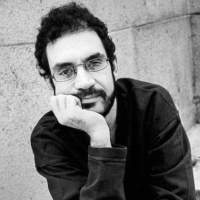
Renato Russo was a Brazilian singer and songwriter. He was the lead singer of the alternative rock band Legião Urbana. A Brazilian film depicting his life and career was released in 2013, called Somos Tão Jovens
Pyotr Ilyich Tchaikovsky
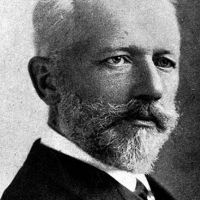
Pyotr Ilyich Tchaikovsky was a Russian composer of the romantic period, whose works are among the most popular music in the classical repertoire. He was the first Russian composer whose music made a lasting impression internationally, bolstered by his appearances as a guest conductor in Europe and the United States
Dietrich Buxtehude
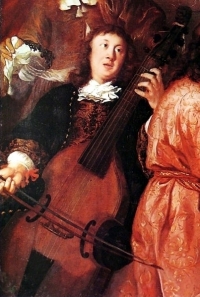
Dieterich Buxtehude (German: ; Danish: Diderich, pronounced ; c. 1637/39 – 9 May 1707) was a Danish-German organist and composer of the Baroque period. His organ works represent a central part of the standard organ repertoire and are frequently performed at recitals and in church services. He composed in a wide variety of vocal and instrumental idioms, and his style strongly influenced many composers, including Johann Sebastian Bach, his student. Today, Buxtehude is considered one of the most important composers in Germany of the mid-Baroque.
Jim Croce
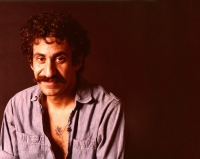
James Joseph Croce (/ˈkroʊtʃi/; January 10, 1943 – September 20, 1973) was an American folk and rock singer-songwriter. Between 1966 and 1973, Croce released five studio albums and numerous singles. During this period, Croce took a series of odd jobs to pay bills while he continued to write, record, and perform concerts. After forming a partnership with songwriter and guitarist Maury Muehleisen his fortunes turned in the early 1970s. His breakthrough came in 1972; his third album You Don't Mess Around with Jim produced three charting singles, including "Time in a Bottle", which reached No. 1 after his death. The follow-up album, Life and Times, contained the song "Bad, Bad Leroy Brown", which was the only No. 1 hit he had during his lifetime.
Boudewijn COX
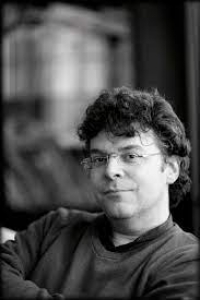
While Boudewijn Cox primarily creates unity in works for smaller forces through thematic-motivic elaboration, in his orchestral works he works to a striking ...
Karl Jenkins
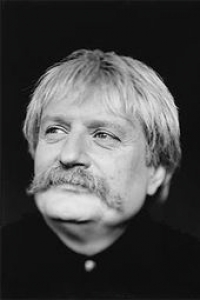
Karl William Pamp Jenkins, CBE (born 17 February 1944) is a Welsh musician and composer.
Lipps Inc.
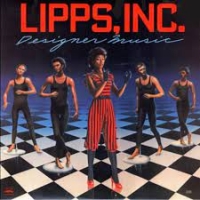
Lipps Inc. was an American disco and funk group from Minneapolis, Minnesota. The group is best known for the chart-topping 1980 worldwide hit single "Funkytown", which hit No. 1 in 28 countries and was certified as double platinum in sales.
Nicola matteis
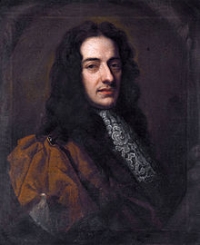
Nicola Matteis (Matheis) (fl. c. 1670 – after 1713) was the earliest notable Italian Baroque violinist in London, whom Roger North judged in retrospect "to have been a second to Corelli," and a composer of significant popularity in his time, though he had been utterly forgotten until the later 20th century.
Very little is known of his early life, although Matteis was probably born in Naples, describing himself as 'Napolitano' in several of his works. He came to London in the early 1670s and according to the diarist Roger North, had a city merchant as a sponsor, who schooled him in the ways of currying favor from the gentry (by allowing them to accompany him in parlor recitals and other minor performances)
Very little is known of his early life, although Matteis was probably born in Naples, describing himself as 'Napolitano' in several of his works. He came to London in the early 1670s and according to the diarist Roger North, had a city merchant as a sponsor, who schooled him in the ways of currying favor from the gentry (by allowing them to accompany him in parlor recitals and other minor performances)
Giuseppe Tartini
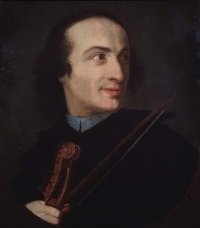
Giuseppe Tartini (8 April 1692 – 26 February 1770) was an Italian Baroque composer and violinist born in the Republic of Venice.Tartini was born in Piran (now part of Slovenia), a town on the peninsula of Istria, in the Republic of Venice to Gianantonio – native of Florence – and Caterina Zangrando, a descendant of one of the oldest aristocratic Piranese families.it appears Tartini's parents intended him to become a Franciscan friar and, in this way, he received basic musical training. Tartini studied violin first at the collegio delle Scuole Pie in Capodistria (today Koper).
Max Bruch
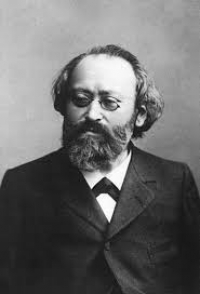
Max Bruch (6 January 1838 – 2 October 1920) was a German Romantic composer, teacher, and conductor who wrote more than 200 works, including three violin concertos, the first of which has become a staple of the violin repertoire.Max Bruch was born in 1838 in Cologne to Wilhelmine (née Almenräder), a singer, and August Carl Friedrich Bruch, a lawyer who became vice president of the Cologne police. Max had a sister, Mathilde ("Till"). He received his early musical training under the composer and pianist Ferdinand Hiller, to whom Robert Schumann dedicated his piano concerto in A minor. The Bohemian composer and piano virtuoso Ignaz Moscheles recognized the aptitude of Bruch.
Chen

Chen Gexin (Chinese: 陳歌辛; pinyin: Chén Gēxīn; Wade–Giles: Ch'en Ko-hsin; September 19, 1914 — January 25, 1961) was a Chinese popular music songwriter. He also used the pen names Lín Méi (林枚) and Qìng Yú (慶餘).Chen Gexin and wife Jin Jiaoli Chen was born on September 19, 1914 to an elite Shanghai family, and his maternal grandfather was from India. He married his admirer and student Jin Jiaoli, against her wealthy family's wishes in 1935. During the Second Sino-Japanese War, he was jailed by the Imperial Japanese Army for his patriotic songs. Chen and his family moved to Hong Kong after the war ended.
Gustavo Leone
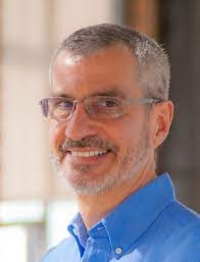
Composer Gustavo Leone is a Professor at the Department of Fine and Performing Arts of Loyola University Chicago. His principal composition teachers included Gerardo Gandini, Marta Lambertini, Ralph Shapey, Shulamit Ran, and John Eaton. He also studied electronic music with Howard Sandroff. Leone is a recipient of a Walter Hinrichsen Award given by the American Academy of Art and Letters. His music is included in the catalogs of C.F. Peters, New York, Toccata Classics, and Naxos Recordings. Ensembles such as Cuarteto Q-Arte, Grant Park Festival Orchestra, the Symphonic Orchestra of Michoacán, the Chicago Sinfonietta and the Czech National Symphony Orchestra, amongst others, have played and commissioned Leone’s works. His work for the theater includes productions at the Yale Repertory Theatre, the Goodman Theater, Victory Gardens Theater, and Teatro Vista.
George Frideric Handel
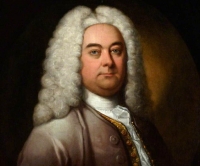
George Frideric (or Frederick) Handel (/ˈhændəl/; born Georg Friederich Händel (About this soundlisten); 23 February 1685 (O.S.) – 14 April 1759) was a German, later British, Baroque composer who spent the bulk of his career in London, becoming well known for his operas, oratorios, anthems, and organ concertos. Handel received important training in Halle and worked as a composer in Hamburg and Italy before settling in London in 1712; he became a naturalised British subject in 1727. He was strongly influenced both by the great composers of the Italian Baroque and by the middle-German polyphonic choral tradition.
Music theory

Music theory is the study of the practices and possibilities of music. The Oxford Companion to Music describes three interrelated uses of the term "music theory"
Sarah Popejoy
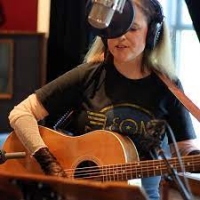
Sarah Popejoy Singer Genre: Folk Songs The Victims Have Names The Victims Have Names · 2021 Self-Righteous Stance
Raw ~ Real Action with Words · 2011 Honorable Man Raw ~ Real Action with Words · 2011
Raw ~ Real Action with Words · 2011 Honorable Man Raw ~ Real Action with Words · 2011
 Sheet Music Network is a site for those who wants to access popular sheet music easily,
letting them download the sheet music for free for trial purposes.
It's completely free to download and try the listed sheet music, but you have to delete the files after 24 hours of trial.
Don't forget, if you like the piece of music you have just learned playing,
treat the artist with respect, and go buy the original sheet music.
Sheet Music Network is a site for those who wants to access popular sheet music easily,
letting them download the sheet music for free for trial purposes.
It's completely free to download and try the listed sheet music, but you have to delete the files after 24 hours of trial.
Don't forget, if you like the piece of music you have just learned playing,
treat the artist with respect, and go buy the original sheet music.